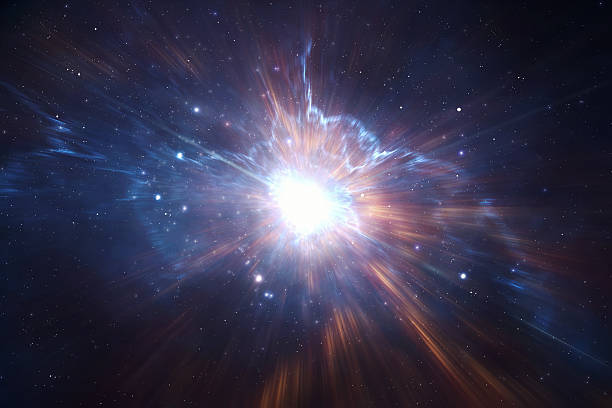The Big Bang Theory
- Stem To Go

- Oct 4, 2021
- 4 min read
The Big Bang Theory is undoubtedly the most popular theory on how the universe began, but what does it actually entail? who was the person that suggested at the idea of the theory? What makes this theory plausible and are there any doubts surrounding it?
--------------------------------------------------------------------------------------

--------------------------------------------------------------------------------------
What is the Big Bang Theory?
The Big Bang Theory is our best guess about how the universe began, but what does the theory actually entail? In a nutshell, the Big Bang theory claims that all of the Universe's current and past matter emerged at the same time, around 13.8 billion years ago. All matter was compressed into an extremely tiny ball with infinite density and intense heat, defined as a Singularity, at this period. The Singularity began expanding, and the cosmos as we know it began to emerge.
The Father of the Big Bang Theory
This startling concept was originally published in a scientific publication by Georges Lemaître, a Belgian cosmologist and Catholic priest, in 1931. In the 1930s, the idea, which is now recognized by practically all astronomers, was a radical deviation from scientific orthodoxy. Many astronomers were skeptical of the claim that the universe was expanding at the time. It seemed absurd that the entire observable universe of galaxies began with a bang.
Lemaître was born in Charleroi, Belgium, in 1894. He was interested in both science and theology as a young man, but World War I disrupted his studies (he served as an artillery officer and witnessed the first poison gas attack in history). Lemaître later studied theoretical physics after the war and was ordained as an abbé in 1923.
At the age of 31, Lemaître acquired a position as a professor at the Catholic University of Louvain, near Brussels, which he held until World War II (when he was injured by U.S. forces in an accidental bombing of his residence). He was a dedicated professor who enjoyed being around his pupils, however he preferred working alone. Throughout his life, Lemaître's religious interests were about as important to him as his scientific pursuits, and he served as President of the Pontifical Academy of Sciences from 1960 until his death in 1966.
What Makes the Theory Plausible?
To begin with, we don't actually "know" whether or not the Big Bang actually occurred. The notion that the Universe originated with a single event that created all of space-time and matter-energy is simply a theory. A theory is a hypothesis that attempts to explain a set of observations. A hypothesis can never be proven, but it surely can be "tested" through observation and study.
The early observations that contributed to the Big Bang Theory involved is what we now call "galaxies," but were previously referred to as "spiral nebulae" at the turn of the century. These nebulae were receding, or moving further away from us, according to American astronomer Vesto Slipher (1875-1969). Slipher discovered this motion in 1912 by analyzing the nebulae's 'spectra,' or the light they generate. Because the light's wavelengths appeared to be lengthened, the lines within it shifted to the longer wavelength (lower energy) portion of the spectrum.
Doubts Surrounding the Theory
Ever since the discovery of an omnidirectional buzz of radiation, also known as the cosmic microwave background, doubts about the how the universe began essentially vanished among mainstream cosmologists in the 1960s, since it's mere existence provides the strongest possible evidence that the universe expanded from an initial violent explosion.
However, suspicions have lingered on the periphery. They've recently become more heated, sparked by a perplexing discrepancy in several studies of how the cosmos is growing. Even scientific centrists admit that our knowledge of the early universe is woefully inadequate. So, the fundamental question stands: Could the Big Bang be wrong?
One important element to remember is that the Big Bang was unlike any other explosion anyone has ever seen. Wendy Freedman, a veteran cosmologist at the University of Chicago, adds, "This is a difficult concept for people to grasp." “The first thing to get rid of is the image of a bomb — which is our first reaction and is simply incorrect — in which there is is an explosion with matter shooting outward from the core. This is not how things work in space. The Big Bang is a space explosion, not an explosion into space. The explosion has neither a center nor an edge.”
Cosmic inflation is a widely believed concept about what happened in the first fraction of a second following the Big Bang, although it remains unproven. The current debate concerning the rate of cosmic expansion could be a result of our lack of knowledge about that period. The Big Bang's origin and mechanics remain a mystery. You may have heard cosmologists discuss the “multiverse,” an oscillating universe with multiple beginnings, or a collision between two reality membranes that formed our universe. Nobody knows which of these theories is right, if any at all, yet what they all have in common is that they all accept the evidence that our current universe originated from an extremely hot and dense early state — in other words, they all begin with the Big Bang.
--------------------------------------------------------------------------------------
Written by: Lana Alutaibi
References:
American Museum of Natural history, "Georges Lemaître, Father of the Big Bang" New Press, 16 Jul 2012, https://www.amnh.org/learn-teach/curriculum-collections/cosmic-horizons-book/georges-lemaitre-big-bang#:~:text=Georges%20Lema%C3%AEtre%2C%20
Williams, Matt, "What is the Big Bang Theory?" Phys.org, 18 Dec 2018, https://phys.org/news/2015-12-big-theory.html
University of Southern Maine, "How do you know that the Big Bang occurred?" Accessed 28 Sep 2021, https://usm.maine.edu/planet/how-do-you-know-big-bang-occurred
Powell, Corey. S, "Could the big bang be wrong?" Discover Magazine, 16 Jun 2019, https://www.discovermagazine.com/the-sciences/could-the-big-bang-be-wrong



Comments